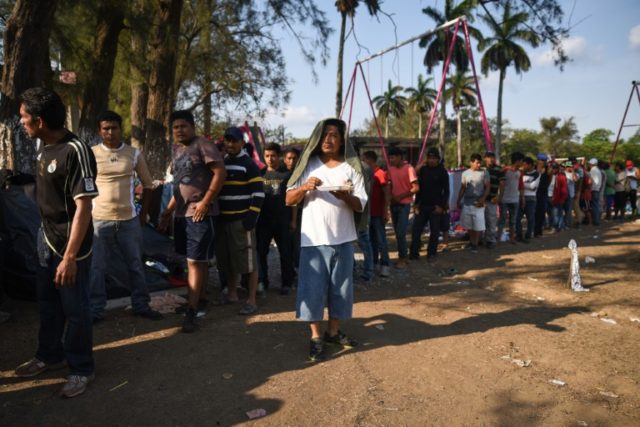Matías Romero (Mexico) (AFP) – The Central Americans crossing Mexico in the migrant caravan that has infuriated President Donald Trump are fleeing gang violence, poverty and political repression.
Here are five of their stories.
– ‘Trump has no idea’ –
At 38 years old, Oscar Dalis is making his second attempt to reach the United States.
There are no jobs in his native El Salvador, he says, and the violence has gotten so bad “you can’t live there.”
Brutal turf wars between gangs like MS-13 and Barrio 18 have given the country the highest murder rate in the world.
Dalis says Trump has no idea what he and the other caravan members are fleeing.
“He had everything in life from the time he was born. But we poor people need whatever chance the rich ‘gringos’ can give us,” he told AFP.
The last time Dalis tried to reach the US, two years ago, he paid a people smuggler $5,000 to take him there, he says. His mother had to mortgage her house to raise the money.
But the smuggler swindled him.
This time, he says, he is determined to cross the border no matter what — illegally, if he has to.
– Gangland violence –
Carol Torres, 26, fled Honduras after her abusive husband hired gang hitmen to attack her, she says.
“They dragged me from my house, brought me all the way to the border and told me to get out of the country,” she told AFP.
She was forced to leave behind her two children, ages five and nine, she says, her vacant eyes fixed on the horizon.
She says she plans to settle in Tijuana, on the Mexican side of the border — not cross into the United States.
“I don’t believe in the American dream, because the president over there is a son of a bitch who doesn’t like immigrants,” she says.
– Political persecution –
William Gomez, 24, says he decided to leave his native Honduras because President Juan Orlando Hernandez — elected in a questionable vote last year — has unleashed a wave of political repression.
“He pays the police to kill those of us who oppose him,” he says.
A machine operator, he says there is no work at home. All he wants is a chance to earn an honest living, he told AFP.
“The people in this caravan are workers, we’re not murderers,” he says.
“We’re not who he thinks we are.”
– Entrepreneurial spirit –
Henry Benitez, 20, is a born entrepreneur.
In his native Honduras, he sold sweets to commuters, but he couldn’t take his stock with him when he left.
Even here, though, in the mountains of southern Mexico living with a caravan of destitute migrants, he has managed to set up an impromptu shop, selling cigarettes, candy and snacks.
Arriving in Mexico with nothing, he begged for money until one day a man gave him 50 pesos (about $3), he says.
He bought two packs of cigarettes, selling his smokes one by one for a tiny profit — which he then reinvested in more stock.
He appealed to Trump: “Give us migrants a chance… We’re all human, we’re all God’s children. You are flesh and blood, just like us.”
– Next generation –
Genesis Graciela is cooing to her one-month-old baby as she waits for Mexican migration officials to finish her paperwork.
The 18-year-old Honduran, who has a slight figure and girlish face, left home three years ago “because the country is poor and there’s no work.”
She was scraping out a living in the town of Tapachula, in southern Mexico, on the border with Guatemala.
But she decided she wanted to try to give a better life to her newborn son.
She is planning to take a bus to the US-Mexican border, then will try to get to New York, where she has relatives.
She knows it won’t be easy.
“The way thing are with Donald Trump, I’ll probably end up working in Tijuana,” she says.

COMMENTS
Please let us know if you're having issues with commenting.